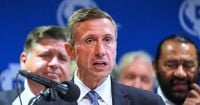The Democratic National Committee (DNC) is once again at the center of a heated debate over which state should claim the coveted first spot in the party’s 2028 presidential primary calendar. At a meeting on August 26, 2025, DNC Chair Ken Martin and Rules and Bylaws Committee co-Chair Minyon Moore kicked off the process, outlining a timeline that promises months of deliberation, lobbying, and—if history is any guide—plenty of political drama. The stakes are high: the order of state primaries can shape not only which candidates gain early momentum, but also which communities’ voices are amplified in the crucial early stages of the presidential race.
"Let me say this for everybody to hear: The presidential calendar process starts today," Martin declared to the Rules and Bylaws Committee, according to reporting from Nexstar Media. He promised a series of meetings stretching through the fall, winter, and spring, all aimed at crafting a calendar that is, in his words, "rigorous, effective, [and] fair." Moore added that the committee would meet in September 2025 to adopt a resolution formalizing how states can apply for early slots in the 2028 primary window—a move that sets the stage for fierce competition among states eager to boost their influence.
Why all the fuss? For decades, a familiar cast—Iowa, New Hampshire, South Carolina, and Nevada—has dominated the early primary landscape. But nothing about this process is set in stone. The DNC has the power to reshuffle the order every four years, and with a new leadership team in place, the appetite for change is palpable. As Martin told The Associated Press, "The idea that we’re just going to sort of rubber stamp the same old calendar, that is not likely what’s going to happen."
The 2024 cycle saw a dramatic shift: South Carolina leapfrogged to the front of the line at the urging of then-President Biden. The move was both a recognition of the state’s pivotal role in Biden’s 2020 comeback and a nod to the importance of Black voters in the Democratic base. New Hampshire and Nevada held their contests simultaneously, while Iowa—long the traditional starting gun—was pushed out. The shakeup was controversial but underscored the party’s willingness to rethink old traditions.
Now, as the DNC gathers in Martin’s home state of Minnesota for its summer meeting, the question looms: Will South Carolina hold onto its prized position? According to the Associated Press, the answer is far from certain. Several DNC leaders, including Vice Chair Shasti Conrad, have openly questioned whether a reliably Republican state like South Carolina is the best choice to kick off the Democratic nomination process. "A priority for me is that there are large communities of color in those states," Conrad said, signaling that demographic representation will be a key consideration. She also chairs the Washington state Democratic Party and is among the 32 newcomers on the 49-member Rules and Bylaws Committee—a group that will vote on any new calendar before it goes to the full DNC.
Behind closed doors, discussions have reportedly centered on whether another Southern state—specifically, a swing state such as North Carolina or Georgia—might better serve the party’s interests in 2028. Both are considered early favorites if a change is made. Martin himself acknowledged that South Carolina could lose its top spot, but he was adamant that a state with a significant Black population would remain prominent: "Clearly, the most reliable constituency of the Democratic Party are Black voters, and they will have a prominent role in the selection of our nominee," he said. "And whether it’s South Carolina or some other states, rest assured that making sure that there’s a state in the mix that actually will battle test your nominee with African American voters is really critical to making sure we can win in November."
The jockeying isn’t limited to the South. Leaders from several states have already started making their cases—some behind the scenes, others in public. Nevada Democrats released a memo on August 27, 2025, arguing that their state should win the top spot if the party is "serious about winning back working-class voters." Hilary Barrett, executive director of the Nevada Democratic Party, wrote, "Given the challenges we are facing to rebuild our party brand, we cannot afford to have overwhelmingly college-educated, white, or less competitive states kick off the process of selecting our party’s nominee."
Meanwhile, the old guard isn’t backing down. Former DNC Chair Jaime Harrison, a South Carolina native, pledged to "fight like hell" to keep his state first in 2028, pointing to its track record as a bellwether: "If you take a look at every presidential primary we’ve had over the last 20 years, South Carolina has been a better predictor than Nevada, Iowa or New Hampshire in terms of picking the eventual nominee," Harrison told the AP. He argued that South Carolina’s electorate is pragmatic, not ideological, and that it deserves a chance to go first in a genuinely competitive cycle. "I think it’s a big slap in the face if you say that you don’t even give South Carolina an opportunity to be first in the nation at least one time in an open primary process, right?"
Of course, not every state is willing to play by the DNC’s rules. New Hampshire, which has a state law requiring it to hold the first primary, famously bucked the party’s 2024 calendar. New Hampshire Democratic Party Chair Ray Buckley—one of the few Rules and Bylaws veterans to keep his seat—insisted that his state will continue to honor its tradition regardless of what the DNC decides. "Everyone has the opportunity to make their case," Buckley said. "New states, interesting states, will make their case. And I have faith that the process will be fair." Iowa, too, has threatened to go "rogue" if it’s excluded again, raising the specter of a fractured and chaotic nominating process.
With so much at stake, the DNC is determined to keep the process transparent and inclusive. The Rules and Bylaws Committee will meet in September 2025 to formalize the application process for early primary slots, with further meetings scheduled through spring 2026. As Martin put it, "We need this process to give us the strongest possible candidate—a candidate that’s battle-tested to win and ready to lead America forward."
For now, presidential hopefuls are hedging their bets, making pilgrimages to all the usual early states—South Carolina, New Hampshire, Iowa, and Nevada—just in case the winds of change don’t blow quite as hard as some predict. But one thing is clear: the fight for the first-in-the-nation primary is just getting started, and the outcome will shape not only the 2028 Democratic nomination but the future of the party itself.
As the DNC embarks on this contentious journey, all eyes will be on the committee’s next moves, with state leaders, activists, and candidates alike waiting to see whose voices will ring out first in the race for the White House.




